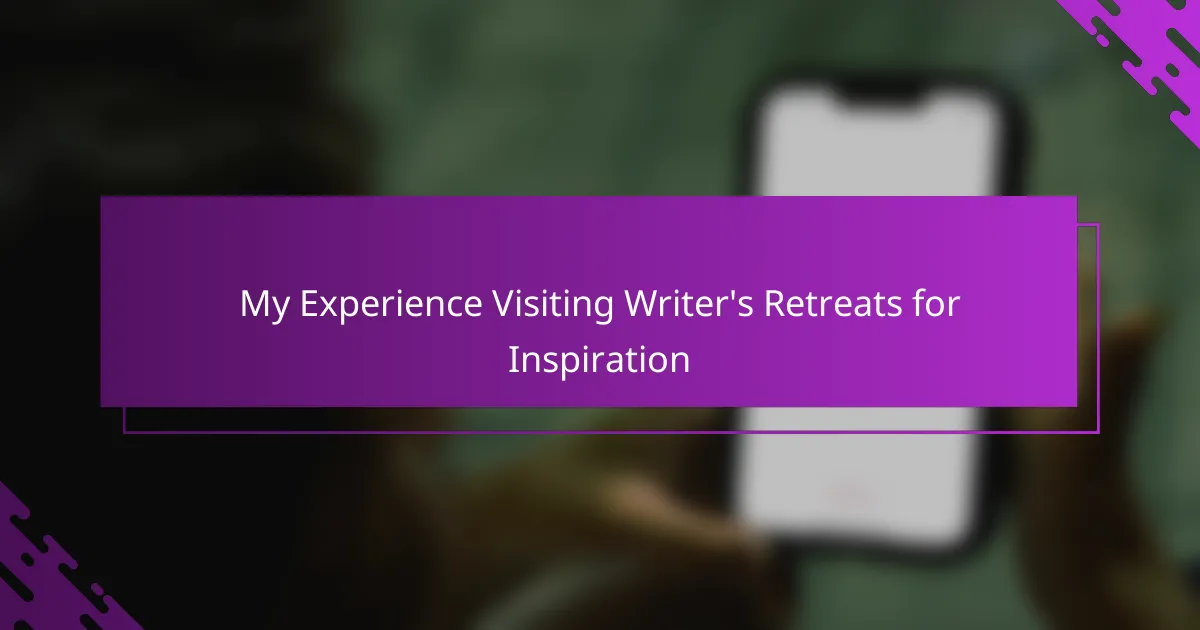Key takeaways
- Writer’s retreats provide an immersive environment that enhances creativity by offering a break from everyday distractions.
- Surrounded by passionate writers, participants experience a surge of inspiration and uninterrupted time to focus on their craft.
- Choosing the right retreat involves finding the right balance of community, structure, and personal comfort to suit individual writing styles.
- Preparing for a retreat includes setting intentions, organizing materials, and minimizing digital distractions to maximize the creative experience.
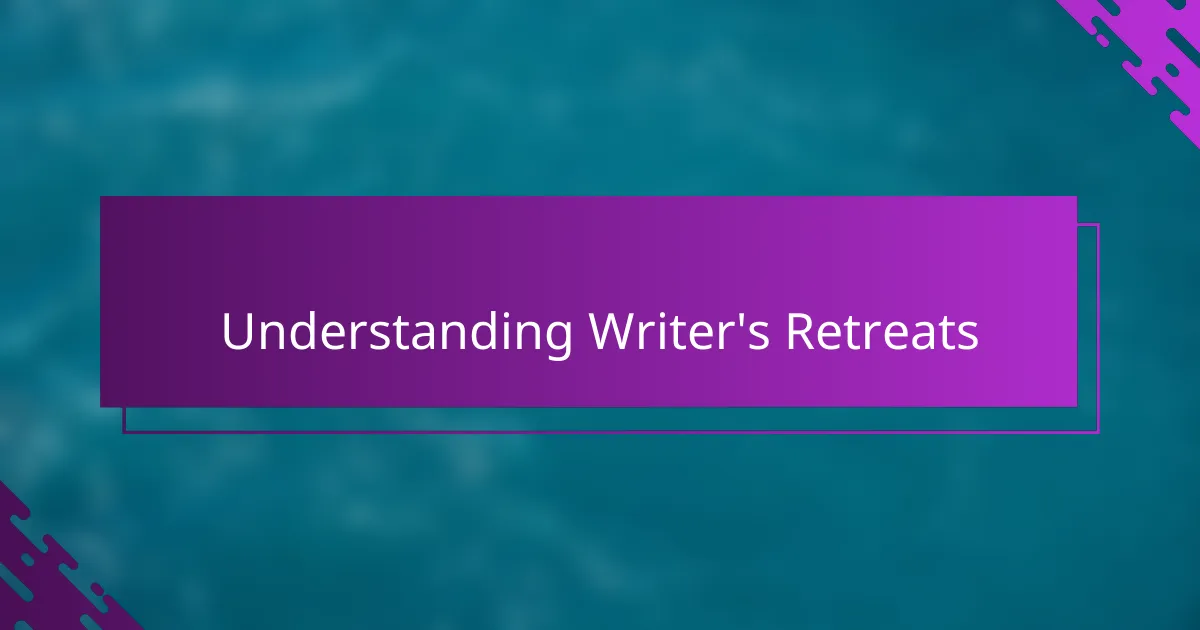
Understanding Writer’s Retreats
Writer’s retreats, from my experience, are more than just quiet places to write—they’re immersive environments designed to recharge creativity. Have you ever felt stuck staring at a blank page? That’s often why these retreats exist: to break away from everyday distractions and dive deep into your writing.
When I first attended one, I was surprised by how the structured yet flexible schedule helped me balance focus and relaxation. It made me realize that writer’s retreats offer not just solitude but a community of like-minded individuals who inspire and challenge you in subtle ways.
I’ve often wondered why these retreats attract so many—perhaps it’s the promise of dedicated time coupled with a nurturing atmosphere. It’s like creating a bubble where the outside world pauses, allowing your thoughts to flow freely without judgment or interruption.
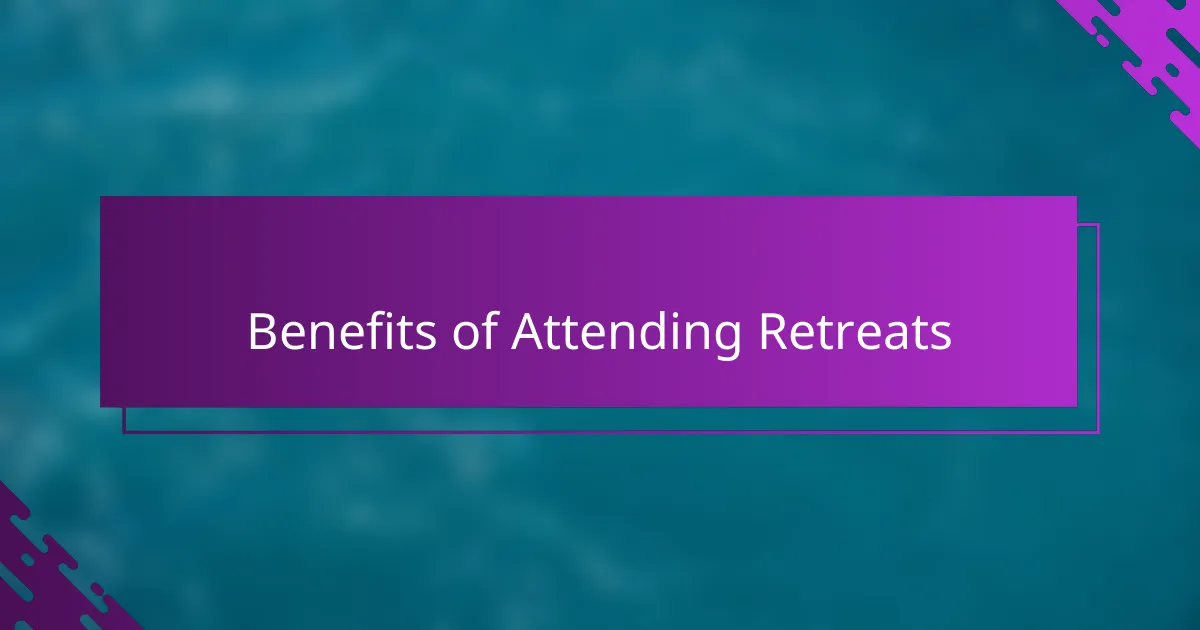
Benefits of Attending Retreats
One of the biggest benefits I noticed at retreats is the sudden surge of inspiration that comes from being surrounded by other passionate writers. Have you ever caught yourself glancing around a room and suddenly felt your own creativity spark just by hearing different ideas? That energy is contagious, and it pushed me to explore new genres and styles I hadn’t considered before.
Another advantage that stood out was the gift of uninterrupted time. In everyday life, distractions pull us in every direction — emails, calls, even simple chores. At the retreat, I found myself naturally slipping into a productive rhythm, free from guilt or pressure. That kind of focus is rare, and it completely transformed how much I could write in just a few days.
Lastly, the emotional boost you get from sharing your work in a safe, encouraging space is something I can’t recommend enough. Receiving thoughtful feedback and knowing you’re not alone in your struggles built a sense of confidence that stayed with me long after the retreat ended. Isn’t that sense of belonging exactly what any writer craves?
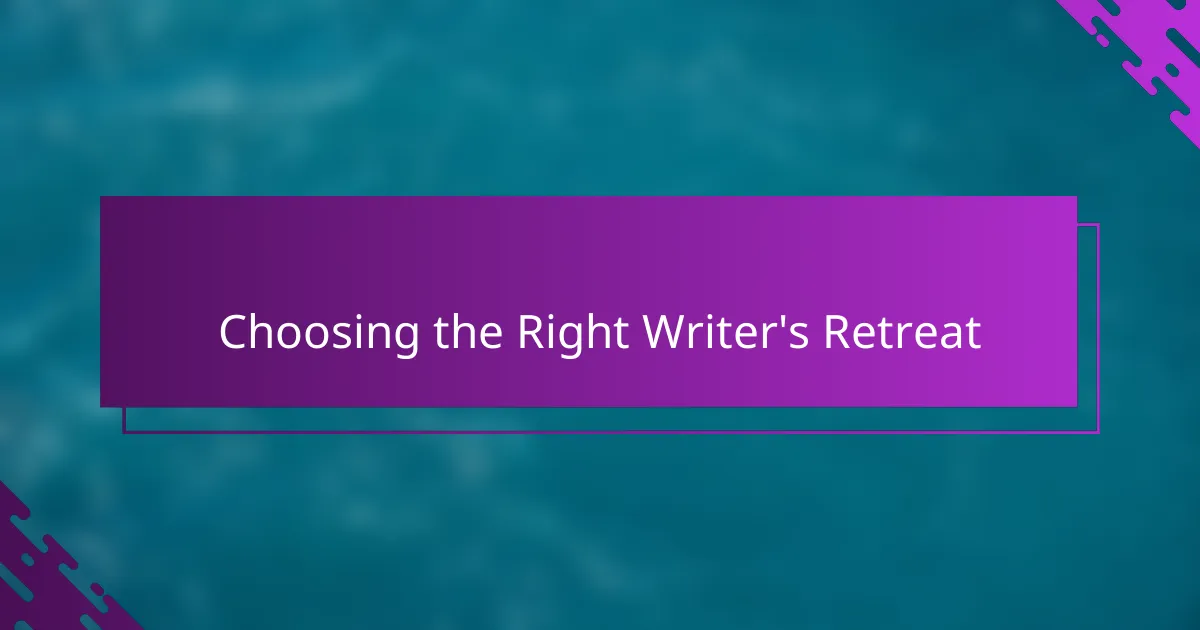
Choosing the Right Writer’s Retreat
Choosing the right writer’s retreat felt overwhelming at first—there are so many options, each promising something unique. I found myself asking, what environment would fuel my creativity best? For me, it was about finding a retreat that matched my writing goals and personal comfort, whether that meant a quiet cabin in the woods or a bustling urban workshop.
I quickly learned that location isn’t everything. The retreat’s structure and community vibe mattered just as much. When I attended a retreat with a rigid schedule, I felt confined rather than inspired, but one with flexible timings gave me the freedom to write when ideas struck, which made all the difference.
Have you ever thought about what kind of support you need? Some retreats offer intense workshops while others focus on solitude and reflection. Deciding what suits your style—do you thrive on group critiques or prefer peaceful seclusion?—can transform your whole retreat experience. I discovered this by trying a couple of different kinds and noticing where I flourished most.
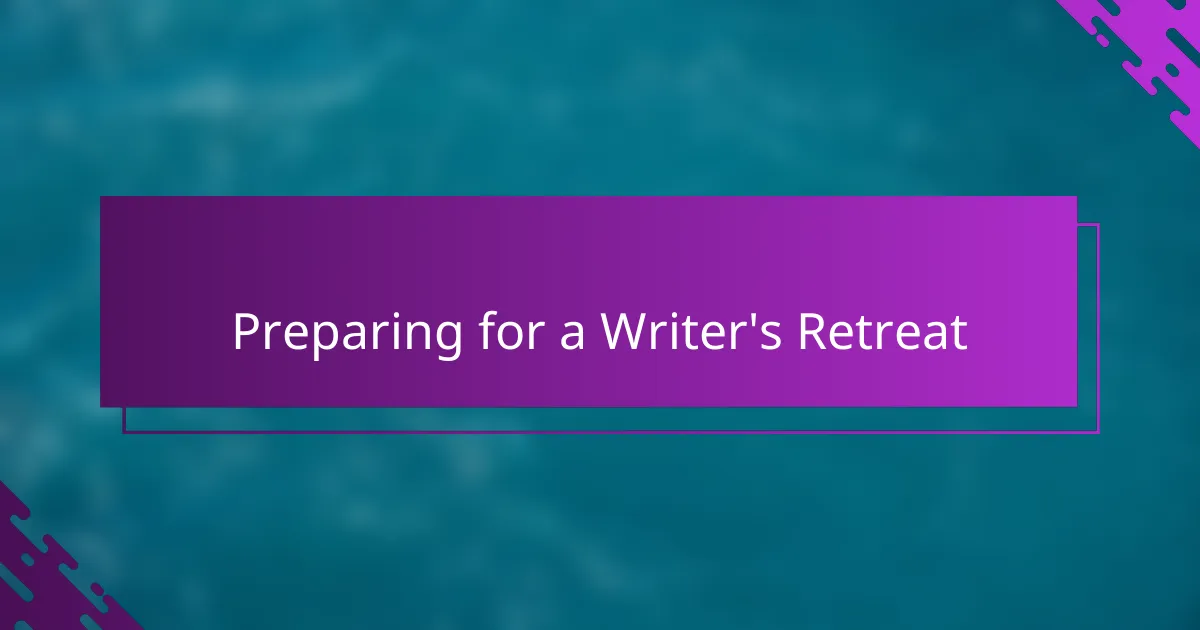
Preparing for a Writer’s Retreat
Preparing for a writer’s retreat meant more than just packing my laptop and notebooks—it was about setting mental intentions. Have I considered what I really wanted to accomplish during those dedicated days away? Knowing this helped me decide what to bring and how to structure my time once I arrived.
I also found that organizing my writing materials ahead of time made a huge difference. I gathered favorite pens, a reliable journal, and even a few prompts that had sparked ideas before. This small preparation quieted the usual anxiety about “getting started” and let creativity flow more naturally.
One unexpected insight? Leaving my usual digital distractions behind was tougher than I anticipated, but absolutely necessary. I asked myself, could I truly unplug from social media and emails? Committing to that boundary helped protect the retreat’s immersive experience, making every moment feel fully mine for writing and reflection.
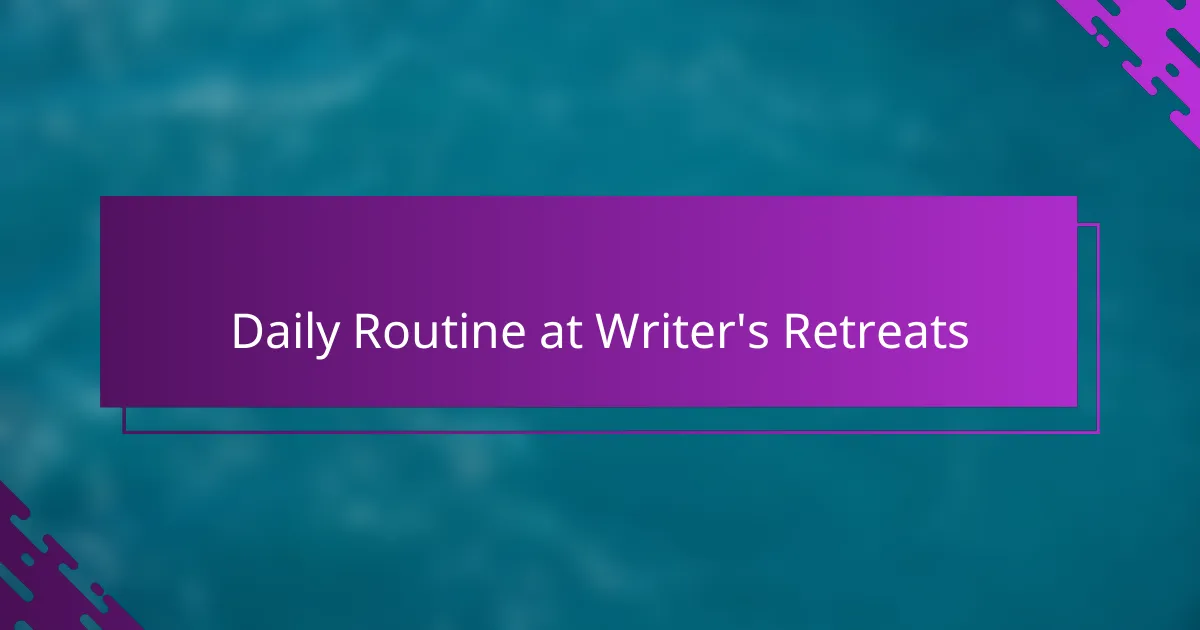
Daily Routine at Writer’s Retreats
Each morning at the retreat started with a quiet ritual—coffee in hand, I’d sit by the window and let the fresh air stir my thoughts before diving into writing. Have you ever noticed how those first gentle moments can set the tone for the whole day? For me, this calm start helped reset my mind and sparked ideas I hadn’t consciously been chasing.
Afternoons were often a mix of focused writing sessions and gentle breaks—sometimes a walk, other times chatting with fellow writers over tea. I realized that balancing intense creativity with small pauses kept my energy flowing without feeling drained. It’s a rhythm I hadn’t valued as much before, but at the retreat, it became essential.
Evenings offered a chance to share work, reflect on the day, or simply unwind in silence. Did I find these moments crucial? Absolutely. They gave me the space to absorb feedback and recharge emotionally, making each new morning feel fresh and full of potential.
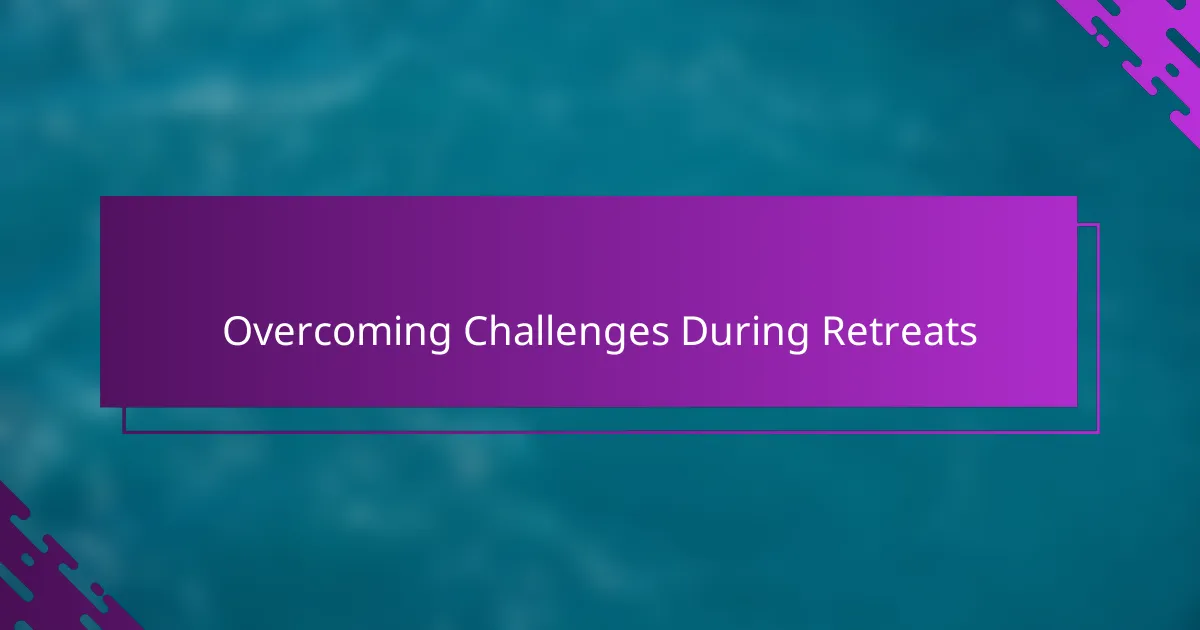
Overcoming Challenges During Retreats
Challenges at retreats aren’t always obvious until you’re right in the middle of them. I remember the first time I struggled with loneliness despite being surrounded by other writers—it felt strange to be so isolated in a crowd. Have you ever felt that tug between craving solitude and needing connection? Finding the balance became a personal journey, teaching me to reach out and also to embrace quiet moments without guilt.
Another hurdle I encountered was the unpredictable nature of inspiration. There were days when the ideas flowed effortlessly, and others when every sentence felt forced. How do you push through those dry spells? For me, it helped to change my environment within the retreat—switching from my usual writing nook to a sunny porch or a cozy café nearby. Shaking things up, even slightly, often reignited my creative spark.
Finally, unexpected distractions can sneak in, from noisy neighbors to technical glitches. At one retreat, a sudden power outage meant no laptop for several hours, which initially threw me off. Instead of panicking, I turned it into an opportunity to draft ideas by hand and reflect on my story’s direction. Have you ever turned a setback into a creative advantage? Those moments, though frustrating at first, often lead to surprising breakthroughs.
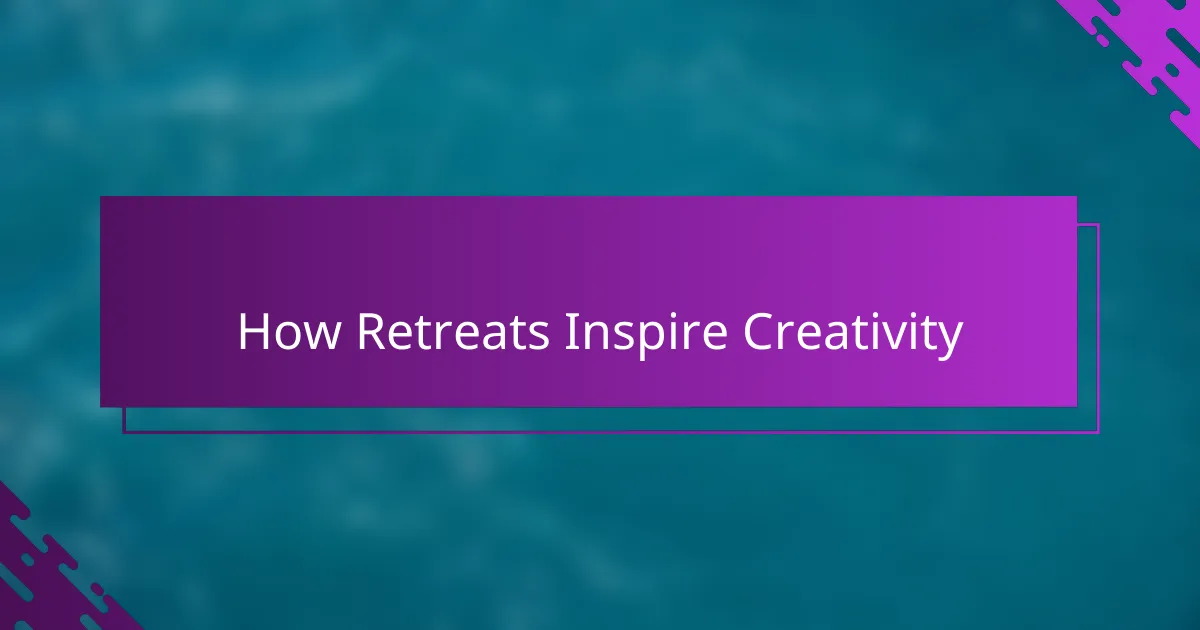
How Retreats Inspire Creativity
There’s something about stepping into a retreat space that immediately shifts how your brain works. Have you noticed how simply changing your surroundings can unlock thoughts that seemed trapped before? For me, the calm and intentional setting of a retreat creates a mental freedom where ideas surface naturally—no pressure, just pure discovery.
I’ve found that the presence of other writers, even when we’re quietly working in shared spaces, fuels a unique kind of creative energy. It’s like being part of an invisible current of inspiration, where seeing others immersed in their craft nudges you to push your own boundaries. That subtle encouragement makes a huge difference, especially on days when motivation feels thin.
Most importantly, retreats give you permission to slow down and listen to your inner voice without interruptions. Does that sound simple? Yet it’s incredibly rare in everyday life. When I allow myself this quiet focus, my writing transforms from a task into an unfolding journey—one that’s richer, deeper, and more true to my own vision.
